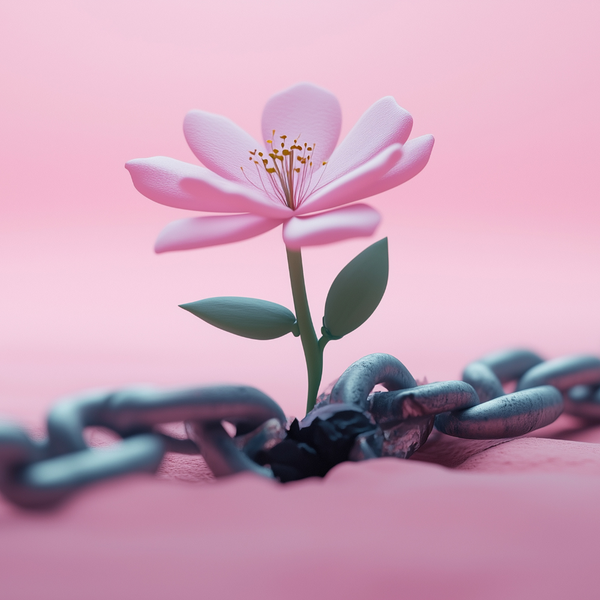Not every person who means well does well.
Not every “help” truly helps.
And not every path that works for others is safe for you.
It’s a truth that can feel heavy to hold — especially for those of us with open hearts.
Because when you’ve been hurt by those you love, yet surrounded by others who “mean well,” it can feel like you’re trapped between two worlds: one of pain and one of misunderstanding.
There comes a moment on every healing journey when the veil lifts—
when the stories we were taught about “family,” “loyalty,” and “forgiveness” begin to unravel.
When we realize that not everything done in love was loving.
And that good intentions do not erase harm.
Many of us were raised to see dysfunction as normal.
We called survival love.
We called chaos home.
We called harm discipline and silence respect.
And then one day, your body starts to protest what your mind has excused.
The heart whispers, “This isn’t love.”
And your soul—tired of pretending—says, “No more.”
💫 The highest and purest truth is this:
Someone’s good intentions don’t cancel out your right to safety, peace, or distance.
Discernment is not judgment — it’s wisdom guided by love.
And boundaries are not walls — they are doors that decide who enters with respect.
You can understand someone’s pain, their history, and their intentions—
and still choose to protect yourself from their behavior.
Compassion is not compliance.
Understanding is not permission.
And love does not mean tolerating harm.
When "Well-Meaning" Becomes Wounding
It’s one of the most painful awakenings—to see that even those who mean well can wound deeply.
They may not realize the full extent of what you’ve endured.
They may offer advice based on their experiences, not yours.
They may tell you to “just talk it out,” “forgive and move on,” or “they didn’t mean it.”
But sometimes the people giving advice are missing the most crucial detail:
context.
They don’t see what happens behind closed doors.
They don’t understand the gaslighting, the control, the silent punishments, the emotional landmines.
They weren’t there for the nights you cried alone, for the subtle manipulations that made you doubt your own memory.
Their words come from love—but without truth, love can mislead.
Good intentions without awareness can still perpetuate harm.
The Blind Spots of Good Intentions
Most people give advice from the map of their own lives.
They assume your terrain looks like theirs.
They don’t see the hidden cliffs or the history beneath your calm surface.
When someone hasn’t experienced gaslighting, manipulation, or emotional abuse, they can’t grasp how dangerous “just talking it out” can be.
When someone grew up in a safe home, they can’t imagine how unsafe “family gatherings” can feel.
They see your situation through the lens of their normal — not your reality.
And so their advice, though well-intentioned, becomes a dagger wrapped in kindness.
Not everyone who speaks from love speaks from truth.
The Normalization of Pain
We live in a world where harm often hides behind the mask of “normal.”
Where phrases like “They’re just like that,” or “It’s just family,” are used to excuse behavior that should never be acceptable.
Where people laugh about trauma over dinner, calling it “just how we grew up.”
When abuse, neglect, or volatility becomes routine, it rewires the nervous system.
You learn to tolerate what should never have been tolerated.
You learn to minimize pain just to function.
And over time, the body begins to confuse familiarity with safety.
I once heard someone say, “I love my dad dearly, and he tried to choke me out before.”
Said casually. As if it were just another rough moment between people who care.
And my heart broke—because that’s how generational trauma hides in plain sight.
It gets wrapped in humor.
It gets softened by nostalgia.
It gets normalized in the name of forgiveness.
But love that harms is not love—it’s an injury wearing love’s name.
What’s been normalized still needs to be healed.
Discernment: Seeing Without Denying
Discernment is the sacred act of seeing clearly—without sugarcoating or vilifying.
It’s not about labeling people as “good” or “bad.” It’s about recognizing what’s safe and what’s not.
Discernment says:
“I can love you and still not let you near me.”
“I can see your pain and still hold you accountable.”
“I can understand your trauma and still choose not to make it mine.”
You’re not being cruel by drawing a line; you’re being clear.
You’re not rejecting love; you’re redefining it to include yourself.
And when you start to see clearly, it’s both heartbreaking and liberating.
You realize how much harm you once justified, how many red flags you painted over, how often you called fear “respect.”
But clarity is how healing begins.
Discernment is not judgment—it’s love with eyes wide open.
Why We Excuse Harm
It’s uncomfortable to face the truth that people we love have hurt us.
So we minimize it.
We rationalize it.
We say things like:
“They didn’t mean it.”
“They had a rough childhood.”
“They’re trying their best.”
And all those things may be true.
But they don’t change this: hurt is still hurt.
Your inner child doesn’t care whether the harm was intentional—
only that it happened.
When we normalize abuse or dysfunction, we teach ourselves that pain is the price of belonging.
But real love does not demand the abandonment of your boundaries.
Understanding the reason behind the wound doesn’t make it hurt less—it just helps you choose not to repeat it.
The Cost of “Keeping the Peace”
Many sensitive souls were taught to keep the peace at all costs—
to smooth over conflict, to make others comfortable, to be “the bigger person.”
But peace built on silence is not peace—it’s suppression.
When you keep returning to environments that drain your light,
you’re not being loving—you’re being loyal to your own undoing.
True peace cannot exist in the same space as fear.
So yes, you can forgive and walk away.
You can love and still choose distance.
You can be understanding and still say no more.
Sometimes “keeping the peace” means walking away so your soul can finally rest.
Breaking the Cycle of Normalized Dysfunction
Healing begins with telling the truth—especially the truths your family never could.
The truth that yelling is not communication.
That manipulation is not love.
That control is not care.
That violence, even when followed by “I love you,” is still violence.
When you name what was once unnamed, you begin to reclaim your power.
You stop carrying generations of silence in your throat.
You stop accepting “it’s just how they are” as your destiny.
Because here’s the sacred reality:
You were never meant to inherit their pain—you were meant to transform it.
You break the cycle not by blaming, but by refusing to repeat what broke you.
The Balance Between Empathy and Self-Protection
You can be deeply compassionate without being codependent.
You can see someone’s goodness without denying their harm.
You can pray for their healing while still protecting your own.
Empathy says, “I see your pain.”
Discernment says, “But I will not let it consume me.”
To hold both truths at once is spiritual maturity.
You can acknowledge someone’s humanity while safeguarding your own peace.
You can love people without giving them access to you.
You can hold compassion for someone’s story without surrendering your safety to it.
Discernment: The Compass of the Soul
Discernment isn’t cynicism. It’s clarity.
It’s the sacred ability to feel into what aligns with your peace and what threatens it.
It’s the whisper that says, “This advice isn’t wrong, but it’s not right for me.”
It’s the intuition that flares when someone’s suggestion would place you back in harm’s way.
Discernment is love wearing armor — soft-hearted, but clear-eyed.
It recognizes that even “nice” people can perpetuate harm when they refuse to see reality.
You can honor their intentions without obeying their direction.
You can appreciate their care while declining their counsel.
Because ultimately, it’s not their job to live your life — it’s yours.
Discernment is the bridge between compassion and self-respect.
Boundaries: Love in Its Most Honest Form
Boundaries often make others uncomfortable — especially those who benefit from your lack of them.
But boundaries are sacred. They’re how you say, “My peace matters. My healing matters. My safety matters.”
You can hold compassion for others and still choose distance.
You can forgive someone and still never allow them close again.
You can love people from afar — quietly, prayerfully, and safely.
A boundary isn’t a punishment; it’s a declaration of self-worth.
It’s a way of saying: “I can see your good heart, but I won’t let it override my intuition.”
Healthy love says “yes” to peace more often than it says “yes” to people.
Sacred Balance: Understand Without Absorbing
It takes maturity to recognize that two truths can exist at once:
- Someone can mean well and still be misinformed.
- They can love you and not know how to protect you.
- They can care about you and still unintentionally lead you into harm.
Spiritual maturity isn’t about vilifying others — it’s about seeing clearly.
It’s saying, “I understand your heart, but I must follow my own discernment.”
This is the balance point between empathy and empowerment:
you can hold space for someone’s humanity without sacrificing your own safety.
Compassion without discernment leads to chaos — discernment without compassion leads to isolation. You need both.
Navigating Love, Loyalty, and Self-Preservation
Many people fear that choosing themselves means abandoning others — especially family.
But real love doesn’t demand self-betrayal.
You can love others and choose not to give them access to you.
You can wish them healing and keep your peace intact.
You can pray for them from afar without returning to their chaos.
When you prioritize your peace, you are not betraying your family — you are breaking a pattern.
You are ending cycles that survive on silence, guilt, and misplaced loyalty.
Choosing peace over proximity is not cruelty — it’s clarity.
Practical Guidance for the Path of Discernment
- Pause Before Agreeing:
When someone offers advice or pressure, don’t respond right away.
Take a breath and ask yourself, “Would following this feel safe or self-abandoning?” - Trust the Tightness:
If your body tenses when you imagine doing what someone suggests, listen. The body remembers what the mind rationalizes away. - Refuse to Over-Explain:
You don’t owe a full story to everyone who questions your boundaries. A simple, “I appreciate that, but this is what feels right for me,” is enough. - Discern Energy, Not Just Words:
Someone’s tone and presence tell you more than their vocabulary. Notice how your spirit feels around them. - Anchor in Prayer or Meditation:
When others’ opinions grow loud, return to the still voice of your own soul. Ask: “What brings me peace?” That’s your compass.
If peace is your destination, discernment is your map.
A Blessing for Boundaries and Clarity
“Divine Source of Infinite Wisdom and Light,
Thank You for teaching me that good intentions are not always safe directions.
Help me to discern the difference between love that heals and love that harms.
Grant me the strength to set boundaries without guilt,
and the grace to release what does not honor my peace.
May I forgive without returning, understand without absorbing,
and walk with compassion that includes myself.
Surround me with those who see my truth clearly and honor it fully.
So it is, and so it shall be.”
A Personal Reflection
For a long time, I thought that love meant understanding everyone’s side.
That being spiritual meant turning the other cheek endlessly.
That to be compassionate meant to endure what others couldn’t handle.
But over time, I learned that “understanding” can become a cage.
It keeps you analyzing people’s pain while neglecting your own.
And sometimes, the most loving thing you can do is see clearly—and walk away.
Not because you hate them, but because you’ve finally decided to stop hurting yourself on their behalf.
I’ve been in those conversations — the ones where relatives or well-meaning friends suggest things that sound harmless, even helpful… but that would have been dangerous in my reality.
They didn’t know the full story — the years of neglect, gaslighting, manipulation, and quiet harm that shaped what I now protect.
They thought they were helping. But what they were really asking was for me to return to a battlefield I barely survived.
It’s not that they were wrong — they just didn’t know what safety meant for me.
So I learned to smile gently, thank them, and quietly choose differently.
To stop over-explaining my boundaries.
To trust that God saw the full picture, even when others didn’t.
And slowly, I began to understand:
I don’t have to make others understand my healing path — I just have to walk it.
When my extended family offered well-intentioned suggestions about reconnecting or “finding common ground,” they didn’t understand the risk.
They didn’t see the years of neglect, volatility, control, and harm that defined what I escaped.
They meant well, but they didn’t know the battlefield they were pointing me toward.
And I realized—it’s okay if they don’t understand.
I don’t need them to.
What matters is that I understand, and that I trust my own discernment over others’ opinions.
Peace doesn’t always come with agreement — sometimes it comes with distance; your healing doesn’t need anyone else’s approval to be valid.
Healing from the Normalization of Harm
- Name What Was Not Okay.
Write down behaviors that were normalized in your family or relationships but that were actually harmful. Seeing them in black and white breaks denial’s spell. - Validate the Innocent Parts of You.
Tell your inner child: “You didn’t deserve that.” Because until you validate your pain, it keeps asking for acknowledgment in quieter, heavier ways. - Redefine Love.
Make a new definition that includes safety, respect, peace, and reciprocity. Love that harms you is not love—it’s programming. - Release the Role of the Healer.
You can pray for others’ transformation, but it’s not your job to make it happen. Healing is a personal choice, not a project. - Anchor in Your Own Wisdom.
When confusion arises, pause and ask: Does this bring me peace or pressure? The soul speaks through peace.
Healing is remembering that love and harm were never meant to coexist.
A Blessing for Discernment and Protection
“Divine Source of Infinite Light and Clarity,
Grant me the strength to see clearly, even when love blinds my sight.
Help me to recognize the difference between intention and impact,
between forgiveness and foolishness,
between understanding and enabling.
Guard my peace as sacred ground.
Teach me to love without losing myself,
to empathize without absorbing,
and to walk away without hate.
Let my discernment be sharp, my compassion be steady,
and my boundaries be blessed.
So it is, and so it shall be.”
Love with Eyes Open
The hardest part of healing is accepting that the people you love may never change—and that you can still love them while choosing peace.
You were not put here to normalize pain.
You were not born to shrink so others don’t have to face their shadows.
You are here to see, to break patterns, to create a new template for love—one rooted in truth.
Discernment is not about judging others; it’s about honoring your own evolution.
Because when you see clearly, you stop confusing survival for connection.
You stop mistaking loyalty for love.
And you begin to build relationships that are aligned with peace, not programmed by pain.
So the next time someone says, “They mean well,”
remember:
Intention does not erase impact.
Kindness does not cancel cruelty.
And love—real love—never asks you to abandon yourself.
The moment you stop normalizing harm, you start normalizing healing.
Want even more content about creativity and art?
Be sure to check out all of our creative chronicles!
Looking to work with feelings, love, healing, and the human experience?
Check out some of our other articles:
-Honoring Others Without Losing Yourself
-Helping Others Without Losing Yourself









